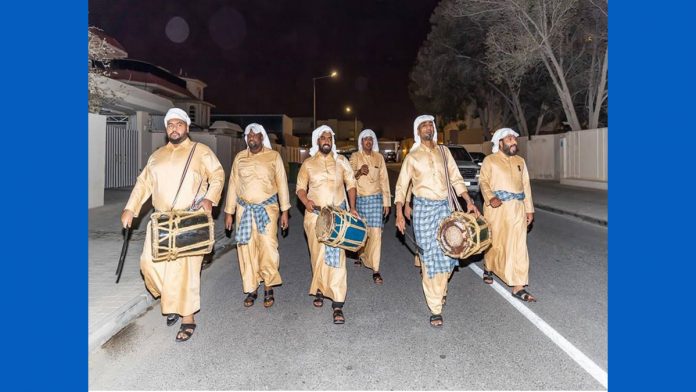DOHA – Drum beats pierced the quiet atmosphere of the night in the nearby neighbourhood of Dafna, signalling the activity of the ‘Masharati’ – where a group of men chants to the beating of drums and tambourines in order to wake people up for sahur (pre-fasting morning meal). The activity continues till the last minute before the call of the ‘Subuh’ (early morning prayer).
The ‘Masharati’ is a commonly practiced for generations and most often conducted voluntarily in most Middle Eastern countries, including Qatar, during Ramadan. And in line with urbanisation and social changes, it has become a profession in its own right.
Atiq Al Sulaiti, a Qatari history and heritage researcher, told the Qatar News Agency (QNA) that ‘Masharati’ players are like a profession in some areas in Qatar.
According to him, the tradition will still be continued and preserved although some may prefer to use the alarm clock for waking up.
“It is still needed. During Ramadan, people who sleep early will easily wake up. But for those who sleep a little late, they definitely need someone to wake them up before the dawn call resounds. This is where the function of this seasonal profession is needed,” he said.
“They (‘Masharati’ players) are not just beating drums and singing songs or ‘dhikr’. In fact, they will call the name of the host they passed and knock on the door,” he said.
He explained that in order to preserve the Ramadan tradition, the relevant agencies have also taken the initiative to create a band consisting of several youths with a performing arts background to perform ‘Masharati’ at tourist hotspots such as ‘Souq Waqif’ (Waqif Market) and ‘Katara’ Cultural Village.
Another local history and heritage researcher, Faisal Al Tamimi, explained that the city of Dafna still maintains this tradition since it was first practiced in 1985.
According to him, the Qatar National Folklore Band group of which he was a member at the time had started the practice and continued it until 1995. After ten years, the group was disbanded before being re -created with new members in early 2013, and continues its activities to this day.
He added that every neighborhood in Qatar has one or more groups of ‘Masharati’ players depending on the size and population of the neighborhood. “The ‘Masharati’ players will start their work about two hours before the time of imsak,” he said.
Ahmed Abdel Hamid, a ‘Masharati’ player, said, “We got a great reaction from the residents while passing through their houses. The children we met were also ecstatic. That’s what keeps us going.”
A Dafna resident, Ali Al Mannai, said the residents wait for the arrival of the ‘Masharati’ players to pass by their houses.
“In fact, some continue to explain this tradition to their children as soon as they see us,” he said, expressing the hope that this profession is preserved and spread widely to various regions in the country as part of Qatar’s cultural heritage.
The practice of ‘Masharati’ has actually started since the time of the Prophet Muhammad (SAW) when Muslims at that time made the call to prayer chanted by Ibn Umm Maktum as a sign to start fasting or stop eating and drinking, whilst the call to prayer of Bilal bin Rabah as taken as a sign to break fast.
As the da’wah of Islam spread, the way information was presented also changed. According to historians, earliest existence of ‘Masharati’ was in Egypt in 238H. At that time, the Governor of Egypt Utbah bin Ishaq realised that people did not pay attention to the practice of sahur, and there is no effort to wake people up for sahur. Thus, he himself took the initiative to walk the streets of Cairo late at night. He walked from the town of Askar to the mosque of Amru bin Al As in Fustat while calling; “Ibadullah, tasahharu fa inna fis sahur barakah” (O servant of God, wake up. Indeed, at dawn there is a blessing).
During the times of Fatimid Caliphate, the changes were seen to be quite extreme when the ‘Masharati’ players were no longer from among the civilians but members of the military. It lasted for several years until the government finallydecided to appoint only one youth in a certain area to perform ‘Masharati’.













